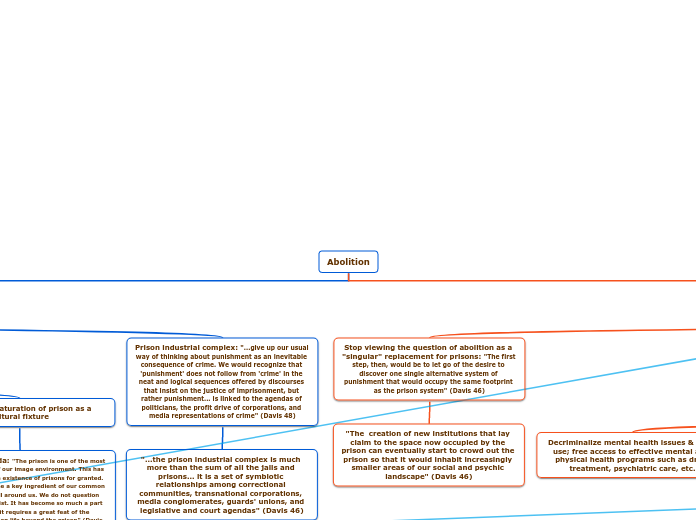Abolition
Constructing a society in which prisons are unnecessary
Anti-capitalist, anti-colonial action
Sense of community and collective power are the antithesis to capitalism/colonialism and the white colonial process that created the prison system
Individualism is considered sacred; narrative of American exceptionalism and personal responsibility prevent us from addressing the systems that generate crime
"Positive de-carceration as our overarching strategy, we would try to envision a continuum of alternatives to imprisonment- demilitarization of schools, revitalization of education at all levels, a health system that provides free physical and mental care to all..." (Davis 46)
Defunding police, prison guards, agents of state violence
What kind of reforms contribute to the broader goal of abolition? What kinds don't (i.e. body cams)?
What does abolition look like in less urban, more rural areas, or even just smaller cities? In these places, many times police don't have much funding to begin with- yet state violence persists.
e.g. protests over Salt Lake City PD killing of Bernardo Palacios-Carbajal did not get much media attention
Decriminalization "illegal" immigration
Change how schools are currently the "major conduits to prison" (Davis 46)
Decriminalize mental health issues & drug use; free access to effective mental and physical health programs such as drug treatment, psychiatric care, etc.
Stop viewing the question of abolition as a "singular" replacement for prisons: "The first step, then, would be to let go of the desire to discover one single alternative system of punishment that would occupy the same footprint as the prison system" (Davis 46)
"The creation of new institutions that lay claim to the space now occupied by the prison can eventually start to crowd out the prison so that it would inhabit increasingly smaller areas of our social and psychic landscape" (Davis 46)
Deconstructing our ingrained ideas of the connection between crime and punishment
Prison industrial complex: "...give up our usual way of thinking about punishment as an inevitable consequence of crime. We would recognize that 'punishment' does not follow from 'crime' in the neat and logical sequences offered by discourses that insist on the justice of imprisonment, but rather punishment... is linked to the agendas of politicians, the profit drive of corporations, and media representations of crime" (Davis 48)
"...the prison industrial complex is much more than the sum of all the jails and prisons... it is a set of symbiotic relationships among correctional communities, transnational corporations, media conglomerates, guards' unions, and legislative and court agendas" (Davis 46)
What is harm? Not all criminalized behaviors are harmful. Not all harmful behaviors are criminalized.
Undoing the saturation of prison as a cultural fixture
Prison propaganda: "The prison is one of the most important features of our image environment. This has caused us to take the existence of prisons for granted. The prison has become a key ingredient of our common sense. It is there, all around us. We do not question whether it should exist. It has become so much a part of our lives that it requires a great feat of the imagination to envision life beyond the prison" (Davis 7)
Incarceration is gendered
"While jails and prisons have been dominant institutions for the control of men, mental institutions have served a similar purpose for women... deviant men have been constructed as criminal, while deviant women have been constructed as insane" (Davis 28)
If someone is committing harm, how do we take care of it? Constructing "a justice system based on reparation and reconciliation rather than retribution and vengeance" (Davis 46)
In many cases, jail is seen as a catch-all convenience. It is not a real solution.
People are incarcerated so that we don't have to engage in larger-scale structural reform to address the root causes that cause crime
People are incarcerated to avoid letting them hurt others (jailing killer cops, rapists, etc). Not necessarily a punitive response, but prison is so saturated into society that no alternative appears possible.
Constructing "a justice system based on reparation and reconciliation rather than retribution and vengeance" (Davis 46)
Restorative justice model
Who has the responsibility to repair harm? Who has the responsibility to punish crime?
"[The lawbreaker] is thus no longer an evil-minded man or woman, but simply a debtor, a liable person whose human duty is to take responsibility for his or her acts, and to assume the duty of repair" (Davis 49- but not her quote)









